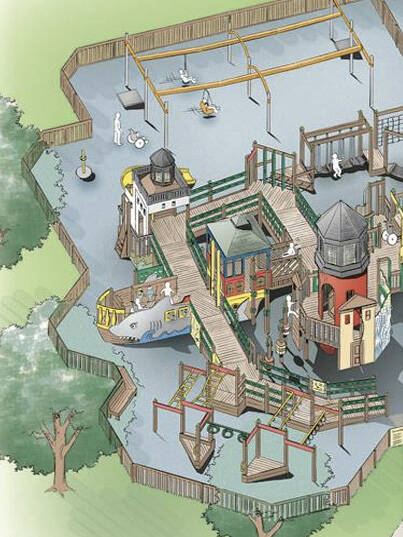When Parks and Recreation Advisory Commission Chair Carrie Stucky sparked the idea of an inclusive regional playground with accessible amenities for children of all skill levels, she was speaking from experience.
Stucky’s 8-year-old son, who has autism, must “work a little harder to understand safety and boundaries,” she said. Sometimes, he spontaneously runs off, even toward a road. Without an area of reprieve at a playground, sometimes he becomes overwhelmed and can’t play as long as other kids. When he was very young, the lack of stability from loose-fill surfacing like wood chips or gravel made it difficult to navigate.
“Something as simple as that absolutely changes the quality of life and their ability to enjoy themselves,” she said.
Moreover, Stucky realized she wasn’t alone.
Naval Air Station Whidbey is considered an exceptional family base, meaning it is particularly equipped to accommodate families with special needs.
In the Oak Harbor School District, 20% of students have some form of a disability, Stucky said, 5% higher than the national average.
According to a study by the Washington Recreation & Park Association, 9 of 10 families with children with disabilities felt they were missing out on play opportunities.
Children cannot grow up emotionally stable if they are unable to make friends, take risks and play, and sometimes the barriers of entry are not immediately obvious for all kids.
Stucky joined the advisory commission a little over a year ago, around the same time Brian Smith was brought on as the parks and rec director. Smith, coming from Glenwood Springs, Colorado, previously developed a special recreation program that was highlighted by the national Recreation & Park Association magazine as an outstanding inclusive program. It was a union of forces.
A collaborative proposal process started with lots of excitement and passion behind it, Stucky said.
One of the city council’s top priorities for Windjammer Park improvements is recreational facilities that are versatile and adaptable to meet the needs of the community, Smith said at a recent city council workshop.
The inclusive regional playground isn’t about meeting any specific special needs, he said, but more of a holistic approach to play. It is designed to remove the barriers of entry for any physical or developmental disability at all ages, even social and communicative.
“Oak Harbor doesn’t have an all-inclusive playground where people with disabilities can improve their physical, cognitive and social skills with their able-bodied friends,” he said. “These children are on the outside looking in.”
One of NAS Whidbey Commanding Officer Capt. Eric Hanks’s top issues is childcare, Smith said. Through the inclusive playground, Smith hopes to support the Navy in that mission.
Childhood flies by, Smith said, sharing a story about a child with cerebral palsy, Turner, who was unable to play with his friends in the same facilities in Glenwood Springs. As is normal, it took years to address these concerns.
“His playground days are getting close to being behind him, but childhood doesn’t wait for government’s purposely measured progress,” Smith said. “I don’t want to meet any more families in our community that have this need that have to wait for their childhood to go by before they can see a project like this happen.”
Inclusivity requirements may be enforced in the future, said Councilmember Shane Hoffmire, so it’s good to be ahead of the curve on this.
“Seeing your eyes light up the way they did talking about your friend Turner, you’re good people,” he said. “I think I’d be willing to take about any hill with you, so this is certainly a fun priority to get behind.”
Currently, the closest inclusive regional playground is over an hour drive away, Smith said. Inclusive regional playgrounds have diverse set ups with opportunities for all ability levels. In Colorado, Smith’s family would travel to these playgrounds not for any particular disability but simply because they are “awesome.”
Inclusive playgrounds are not about putting up a ramp and a handicap accessible swing, he said, but restructuring the entire playground for all abilities. This means communication boards, sensory reprieve zones, safe and accessible surfacing, fencing, exciting equipment, an inclusive layout and an inviting theme in a central location.
The park will be 12,000-16,000 square feet on the west side of Windjammer Park and cost $1,150,000, Smith said. The department is currently applying for grants, and it will be paid in part by program matching and community donations. Park construction will take a month, Smith said, and is easiest in the summertime.
Oak Harbor has a greater need for this kind of accommodation than Glenwood Springs, Smith said, and more opportunities to provide it.
“Once we create what I intend to be the best all-inclusive playground in the state of Washington and the first all-inclusive playground in Island County region, I feel like we have checked off a major point to our to-do list and something we can be really proud of and hopefully get some recognition from media and win a few awards around our efforts to service a real need in our community,” he said.
Councilmember Bryan Stucky liked the emphasis on meeting the needs of all children and age groups.
“As a parent it can sometimes be difficult if your child doesn’t have a physical disability to explain to other parents why awkward behavior is happening,” he said. “I feel like at a place like this it’d be a little more accepting, so I’m obviously all for it.”
Though there was no action being taken yet, parks and rec seemed to have unanimous council support.
“I can’t express how excited I am to see support and enthusiasm from so many people in the community,” Carrie Stucky said. “I think a playground like this will be a major benefit for not only Oak Harbor, but all of Whidbey Island.”



